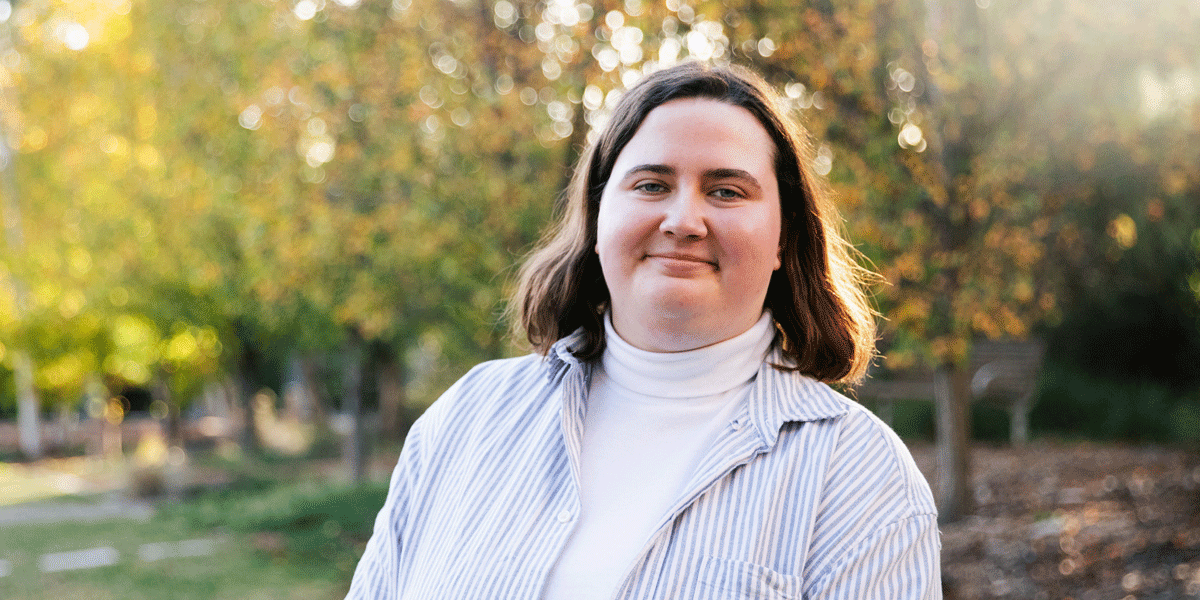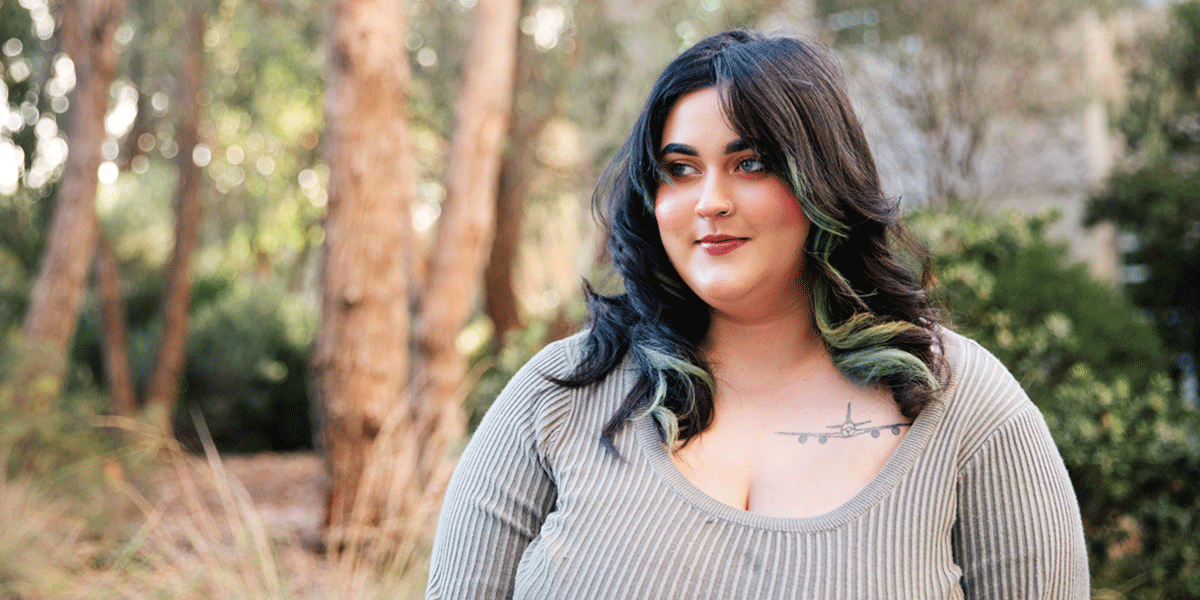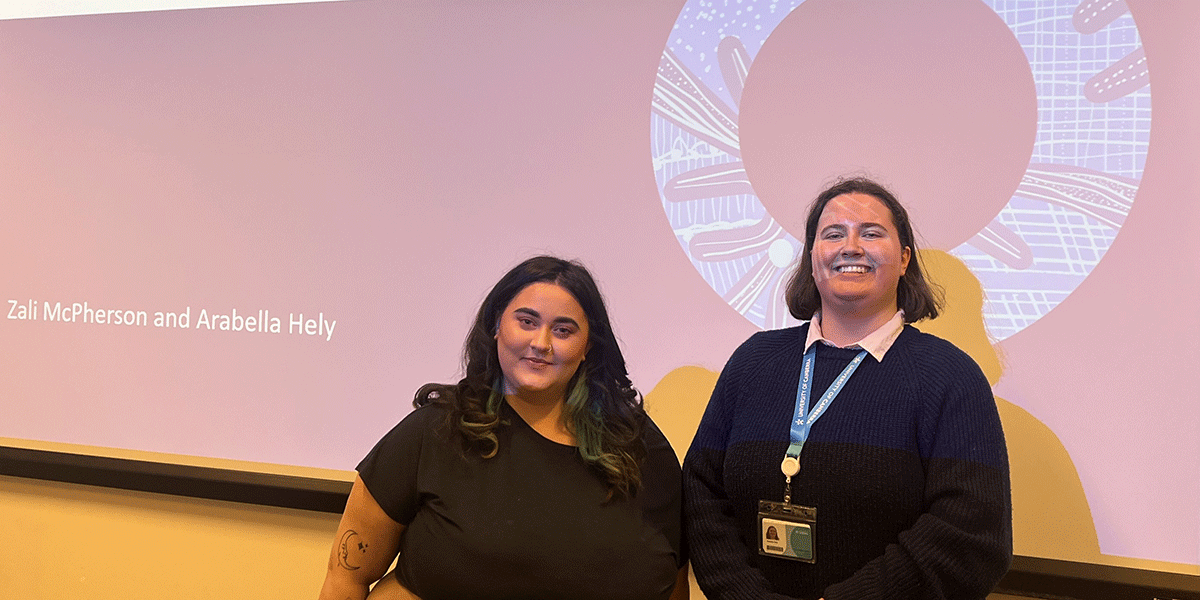Community Connections
Stepping Into Internship takes workplace inclusion to a new level
When Zali McPherson and Arabella Hely commenced their studies at the University of Canberra – a Bachelor of Science majoring in Applied Statistics and Psychological Sciences, and a Bachelor of Occupational Therapy (Honours), respectively – they were excited to start working in fields they were passionate about.
Both were even more delighted when their applications for a paid internship at the University of Canberra through the Australian Disability Network’s Stepping into Internship Program were accepted, and the experience confirmed their enthusiasm for working in the healthcare sector.
Every year, the Australian Disability Network matches university students with disability (who are in their second last year, final year, or have recently graduated) with employers who are seeking interns in a variety of sectors. Students from UC have participated in previous years; however, this was the first time UC has accepted interns, with People and Diversity identifying opportunities across faculties and business units, that may be suitable. Once identified, the opportunities were promoted to students who may be eligible through InclusionUC.
The students completed internships with UC’s Health Research Institute (HRI) and found themselves drawing on both research and their own lived experiences as people with disability, to assist in developing a consumer-driven research framework for healthcare, for use by researchers in the Institute.
The framework is intended to support researchers to identify ways to improve healthcare services and research, by listening to the needs and feedback of health consumers. Zali and Arabella have accessed several health services in the past, and Zali has also had experience working at palliative care provider Clare Holland House, offering strong connections to the work and a fresh perspective for the framework.

“This has sparked my interest in consumer research, and has given me self-confidence as a health care consumer, around how valuable my contributions are,” says Arabella.
Zali agrees, saying “Both of us have an interest in research, but I don’t have a health degree,” she says. “So, my experience in health-related research is limited. It will help with my work in the future as I am now conscious of what patients and their families and volunteers are saying, and how we can better our healthcare research by incorporating what consumers are saying.”
Internship opportunities can be competitive. Having a disability and applying for an internship, as well as navigating any requests for adjustments or additional support could for many, prove to be a barrier to employment. It is this potential barrier that the Stepping Into Internship Program is aiming to address.
“I think finding out about [the opportunity] through InclusionUC and knowing it was run through the external Australian Disability Network, made me feel as though it would be very supportive. Otherwise, entering the workforce, I would still be very nervous. But knowing that there would be the support and that [our manager] Jonathan would have undergone extra training, definitely swayed me to choose it,” Arabella says.
The program equips applicants and their managers with the tools and training to offer work arrangements that suit both employee and employer. Students are supported to understand how to request reasonable adjustments they may require to do their job, and they are assisted with interview preparation and job onboarding.
For Arabella, the process she went through to prepare for her role with UC illustrated how employers can be equipped to recruit and implement measures needed for a more inclusive workplace.
“The Australian Disability Network did an interview with me and that allowed me to ask any questions I had. It was very informal, over Zoom, and I found that process really easy, so I was able to ask questions about what kind of adjustments would be put in place, and they were really good about that.”
Both students spoke of the ease of the application process for them, including small gestures that built their confidence – such as a UC People and Diversity staff member meeting them for their interview and confirming if they were comfortable with using the stairs, or if they would prefer an elevator. “That was just such a nice small thing that really made me kind of go ‘ohhhh’,” Arabella says.

Zali shared that she had been nervous about disclosing her disability in the past, out of concern it may reduce her potential for employment. Experiencing this program has supported her growth and confidence in applying for jobs and the reassurance around future work opportunities.
It’s not just the interns who are benefiting from the training provided by the program. Zali and Arabella’s supervisor and HRI Business Development Manager, Jonathan Ward, agrees.
“One of the key things that drew me to the program is that I’ve recently been diagnosed with a disability. I was navigating this space myself and saw this as an opportunity to learn and create opportunities for other people with disabilities to work at the University,” he says.
“Some interesting takeaways from the training were around workplace adjustments for people with disabilities – they should be focused on removing barriers, not giving extra or special treatment to certain individuals. For example, if you are open and asking what kind of workplace adjustments you need, as a manager, you should also consider if it is something that could benefit everybody and maybe we offer it across the board, rather than just targeted to individuals. I quite liked that.”
Jonathan was quick to praise Zali and Arabella.
“I was a bit blown away by the commitment and the quality of their work. The project we had identified was specific to consumer involvement in healthcare research, and they both had a passion for it, having had personal experiences in the healthcare system.”

UC’s People and Diversity team has also acknowledged that there have been key takeaways from the experience, that have already been applied across UC’s recruitment processes. These include the delivery of interview instructions across different formats, and reasonable adjustments identified earlier in the recruitment process so the candidate experience can be tailored, bringing first-hand experience for managers and teams to create more disability confidence.
Zali and Arabella have now had their employment within UC extended, and will continue their research and administrative support to the HRI team.
“I have been trying to see this internship as more of an experience than a job – a really cool learning experience that I just happened to get paid for. A place to be supported and learn about your needs and advocating for yourself, knowing accommodations you might need and understanding that people are there to support you,” Arabella says.
The next round of Stepping Into Internship opportunities will be advertised in August, for the summer semester break. The University of Canberra is currently participating in the Positive Action towards Career Engagement Mentoring (PACE) program through the Australian Disability Network and will continue participation in these inspiring programs into 2025.
Words by Claire Haining, photographs by Liam Budge.